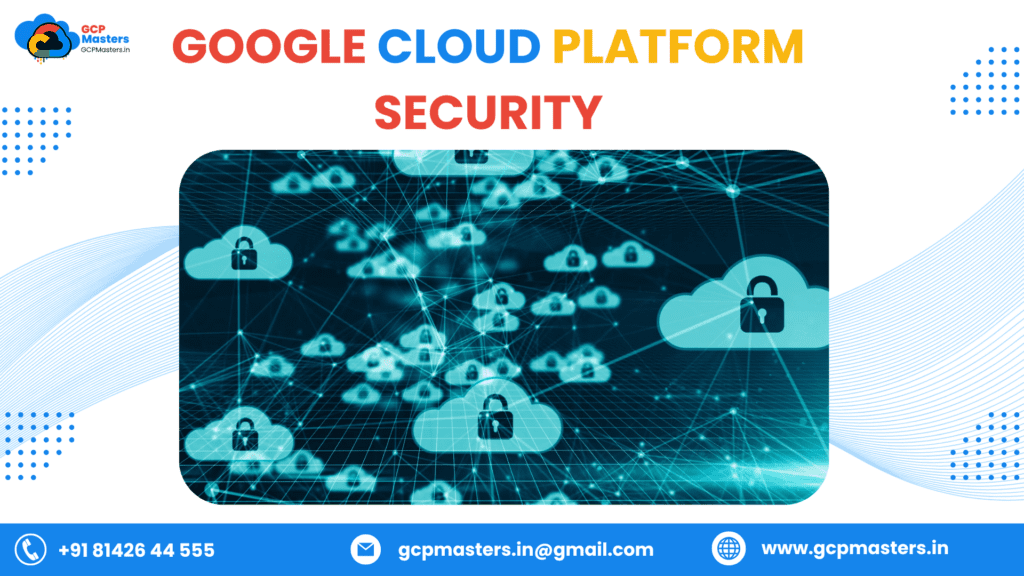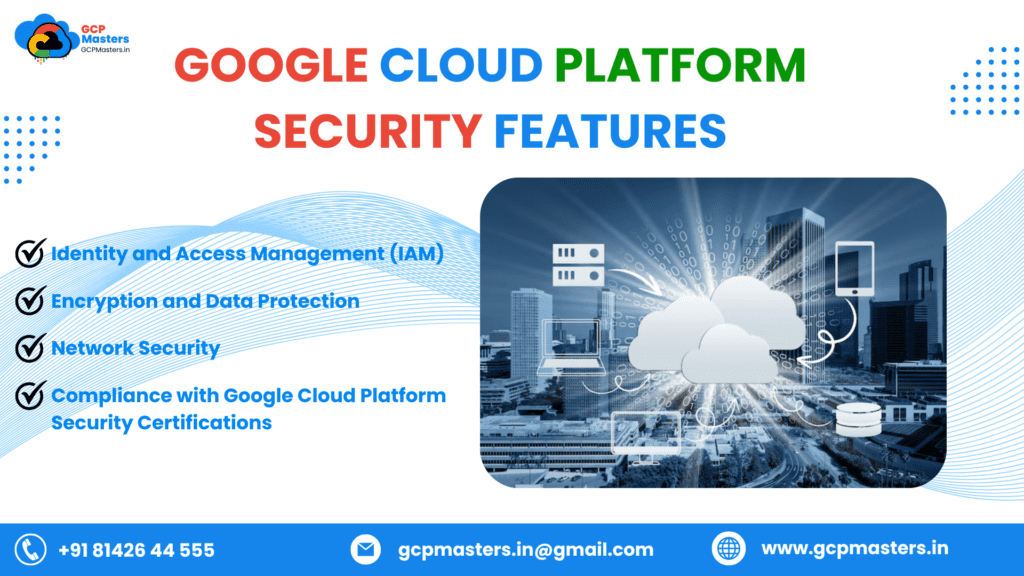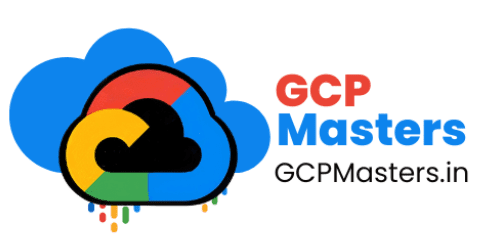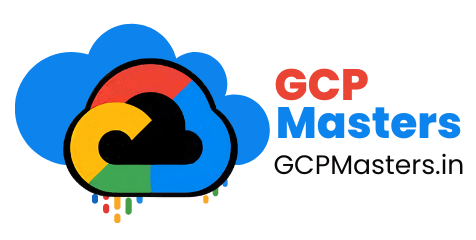Google Cloud Platform Security 2025 : Protect Your Data

Introduction to Google Cloud Platform Security
Cloud computing has changed the way businesses work by making it easier to store data, run applications, and scale operations. However, as more companies move to the cloud, keeping their data and systems secure has become very important. Google Cloud Platform (GCP) Security provides various tools and best practices to help protect cloud resources from hackers, unauthorized access, and security risks. It ensures that businesses can safely use the cloud while keeping their data private and following security rules.
Definition of Google Cloud Platform Security
Google Cloud Platform Security refers to the security measures, policies, and tools that help protect cloud-based resources, applications, and data within GCP. It includes identity management, encryption, threat detection, and compliance solutions designed to safeguard cloud infrastructure. GCP’s security model is built on a shared responsibility approach, where Google secures the underlying infrastructure while customers are responsible for securing their data, applications, and access controls.
Importance of Securing Cloud-Based Workloads
- Securing cloud-based workloads is essential as businesses increasingly rely on cloud computing for data storage, applications, and services.
- Protects sensitive information, including customer data, financial records, and intellectual property.
- Prevents unauthorized access, data breaches, and accidental leaks while ensuring data confidentiality through encryption.
- Ensures regulatory compliance with industry standards like ISO, SOC, HIPAA, PCI-DSS, and GDPR to maintain trust and avoid legal risks.
- Defends against cyber threats such as malware, ransomware, phishing, and DDoS attacks that can disrupt cloud operations.
- Enhances business continuity by minimizing downtime, preventing data loss, and enabling disaster recovery mechanisms.
- Guarantees application reliability, ensuring that services remain operational even during security incidents.
- Strengthens customer trust and business reputation by demonstrating a commitment to security and compliance.
- Adhering to Google Cloud Platform Security best practices helps businesses build a secure, compliant, and resilient cloud environment.

Google Cloud Platform Security overview
- Google Cloud Platform (GCP) provides multiple layers of security to protect cloud resources from threats and unauthorized access.
- Access control mechanisms help manage user permissions using role-based policies, ensuring that only authorized users can access specific resources.
- Least privilege access is enforced, meaning users and applications only get the minimum level of access needed to perform their tasks, reducing security risks.
- Data encryption is used for protection, ensuring that information stored in the cloud (at rest) and data moving between services (in transit) remain secure.
- Encryption keys are managed securely through Google’s Cloud Key Management Service (KMS), preventing unauthorized access to sensitive data.
- A centralized security dashboard is available, allowing businesses to monitor security threats and vulnerabilities in real time.
- Threat detection and response tools help identify security risks, enabling quick action to prevent potential attacks.
- Cloud Armor provides protection against DDoS attacks, ensuring that websites and applications remain accessible even during high-traffic cyberattacks.
- VPC Service Controls add extra security layers, restricting access to sensitive services and preventing data leaks outside authorized boundaries.
- GCP aligns with global security standards and regulations, helping businesses meet compliance requirements for data protection.
- Regular security reports and certifications are available, demonstrating compliance with industry security frameworks and regulatory policies.
Shared Responsibility Model in Google Cloud Platform Security
In Google Cloud Platform (GCP), security is a shared responsibility between Google and its customers. Google protects the cloud infrastructure, while customers are responsible for securing their data, applications, and user access within GCP. This approach ensures that both parties work together to maintain a safe and compliant cloud environment.
Google’s Security Responsibilities
Google ensures the cloud platform is secure and reliable by handling the following:
- Protecting data centers with strict security measures, including access controls, surveillance, and backup systems.
- Securing networks by preventing cyberattacks like DDoS attacks and ensuring safe data transmission.
- Keeping systems updated by regularly applying security patches and monitoring for threats.
- Encrypting data to keep it safe from unauthorized access, whether it is stored or being transmitted.
- Meeting global security standards, such as ISO, SOC, HIPAA, and PCI-DSS, to help businesses stay compliant.
- Providing security tools and alerts to help customers detect and manage security risks.
Customer’s Security Responsibilities
- Managing user access carefully by setting permissions, enabling multi-factor authentication (MFA), and following least privilege access principles.
- Securing data by encrypting sensitive information and correctly setting permissions for storage and databases.
- Keeping applications safe by applying updates, scanning for vulnerabilities, and securing APIs.
- Setting up network security using firewalls and private network controls to prevent unauthorized access.
- Monitoring security threats with Google’s security tools, such as logging and alert systems, to detect and respond to potential risks.
- Ensuring compliance by following security best practices and industry regulations.
How It Aligns with Google Cloud Platform Security Compliance
This shared security model helps businesses meet Google Cloud Platform Security compliance requirements. Google ensures the infrastructure is secure and provides compliance certifications, while customers need to configure their security settings properly to meet industry regulations. By following best practices and using Google’s security tools, businesses can maintain a secure and reliable cloud environment while reducing security risks.

Google Cloud Platform Security features
Google Cloud Platform (GCP) offers strong security features to help protect data, applications, and cloud resources. These features ensure secure access, data protection, network security, and compliance with industry regulations.
Identity and Access Management (IAM)
- Helps control who can access what within the cloud.
- Uses role-based access to ensure users and services only get the permissions they need.
- Supports multi-factor authentication (MFA) for added security.
- Allows secure communication between applications and cloud services using service accounts.
Encryption and Data Protection
- Automatically encrypts data when stored and when transferred across the network.
- Provides secure key management with Cloud Key Management Service (KMS).
- Uses Confidential Computing to keep data protected even during processing.
- Helps prevent data leaks with tools that scan and secure sensitive information.
Network Security (VPC, Firewalls, DDoS Protection)
- Virtual Private Cloud (VPC) allows businesses to create a secure and private network for their cloud resources.
- Firewalls help control traffic and block unauthorized access.
- Cloud Armor protects websites and applications from cyberattacks like DDoS.
- VPC Service Controls add an extra layer of security by restricting access to sensitive data.
Compliance with Google Cloud Platform Security Certifications
- GCP meets global security standards like ISO 27001, SOC 2, HIPAA, and PCI-DSS.
- Provides certifications and audit reports to help businesses meet legal and industry security requirements.
- Offers compliance tools to help businesses follow security best practices.

Google Cloud Platform Security tools
Google Cloud Platform (GCP) offers security tools to help businesses protect their data, detect threats, and secure cloud environments. These tools provide centralized security management, threat detection, encryption, and defense against cyberattacks.
Security Command Center
- Acts as a security dashboard to monitor cloud resources.
- Helps identify security risks, vulnerabilities, and misconfigurations.
- Provides real-time alerts and recommendations to enhance security.
Chronicle Security Operations
- Helps detect and respond to cyber threats using advanced analytics.
- Processes large amounts of security data quickly for faster threat detection.
- Assists security teams in analyzing potential attacks and reducing risks.
BeyondCorp Enterprise
- Ensures only verified users and devices can access cloud applications.
- Removes the need for traditional VPNs, making remote access more secure.
- Continuously monitors user activity and enforces security policies.
Cloud Key Management Service
- Helps businesses manage encryption keys for data security.
- Supports automatic key rotation and access controls.
- Works with Google’s built-in encryption for extra protection.
Cloud Armor
- Protects websites and applications from DDoS (Distributed Denial of Service) attacks.
- Uses machine learning to detect and block suspicious traffic.
- Allows businesses to create custom security rules to prevent unauthorized access.
Google Cloud Platform Security Compliance and Certifications
Google Cloud Platform (GCP) follows strict security and compliance standards to help businesses meet regulatory requirements and protect their data. It provides certifications and compliance tools to ensure organizations operate securely in the cloud.
Google Cloud Platform Security Compliance
- GCP follows global security best practices to protect cloud resources.
- It offers built-in compliance support to help businesses meet industry and government regulations.
- Security measures include encryption, access controls, and continuous monitoring to prevent cyber threats.
- Google provides audit reports and compliance documentation to help organizations verify their security posture.
Industry Standards: ISO, SOC, HIPAA, PCI-DSS, FedRAMP
GCP meets several international and industry-specific security standards, including:
- ISO 27001, ISO 27017, ISO 27018 – Ensures strong information security, cloud security, and data protection.
- SOC 1, SOC 2, SOC 3 – Provides independent reports on security controls and risk management.
- HIPAA (Health Insurance Portability and Accountability Act) – Protects healthcare data and ensures privacy compliance.
- PCI-DSS (Payment Card Industry Data Security Standard) – Ensures secure handling of credit card transactions.
- FedRAMP (Federal Risk and Authorization Management Program) – Meets US government security requirements for cloud services.
Benefits of Achieving Google Cloud Platform Security Certifications
- Ensures regulatory compliance, reducing the risk of legal and financial penalties.
- Builds trust with customers by demonstrating a commitment to data security.
- Helps businesses expand into regulated industries like finance, healthcare, and government.
- Strengthens security posture by following recognized best practices.
- Provides security documentation to assist in audits and compliance reporting.
Challenges in Google Cloud Platform Security Security
Even though Google Cloud Platform (GCP) provides strong security measures, organizations still face challenges in keeping their cloud environments secure. Understanding these issues helps businesses take the right steps to protect their data and applications.
Misconfigured IAM Policies and Access Controls
- If access permissions are not set correctly, unauthorized users may gain access to sensitive data.
- Giving users more permissions than necessary can lead to security risks.
- Managing who has access to what across different teams can be difficult.
Data Security Risks (Breaches, Leaks, and Insider Threats)
- Hackers may try to steal or expose important data.
- If encryption is not properly used, data can be vulnerable to attacks.
- Employees or other insiders with access to sensitive data could misuse it.
Compliance Complexities and Regulatory Challenges
- Businesses must follow different security rules and regulations (like ISO, SOC, HIPAA, PCI-DSS).
- Keeping up with new security requirements can be challenging.
- Not following compliance rules could lead to penalties and legal issues.
Emerging Threats and Importance of Google Cloud Platform Security Bulletins
- Cybercriminals are always finding new ways to attack systems.
- Some security weaknesses, called zero-day vulnerabilities, can be exploited before fixes are available.
- Google releases security bulletins to inform businesses about security risks and updates.
- Regularly checking and applying security updates helps keep cloud systems safe.

Google Cloud Platform Security best practices
To keep cloud environments safe from cyber threats, businesses should follow best security practices on Google Cloud Platform (GCP). These practices help protect data, prevent unauthorized access, and meet security requirements.
Using Security Best Practices in Google Cloud
- Take advantage of Google’s built-in security features to safeguard cloud resources.
- Follow recommended security settings to reduce risks.
- Regularly update security policies to keep up with new threats.
Managing User Access with Least Privilege
- Give users only the access they need to perform their tasks.
- Use Identity and Access Management (IAM) to control permissions.
- Enable multi-factor authentication (MFA) for an extra layer of security.
Encrypting Important Data
- Use encryption to protect stored data from unauthorized access.
- Secure data while it is being transferred between systems.
- Use Cloud Key Management Service (KMS) to manage encryption keys safely.
Using Security Tools for Real-Time Protection
- Enable the Security Command Center to monitor cloud security.
- Use Cloud Logging and Cloud Monitoring to track suspicious activity.
- Set up alerts to respond quickly to security issues.
Conducting Regular Security Checks
- Perform regular security audits to find and fix vulnerabilities.
- Check Google Cloud security bulletins for important updates on new threats.
- Apply security patches and updates to keep systems safe.

Future Trends in Google Cloud Platform Security
As technology improves, Google Cloud Platform (GCP) security is also advancing to better protect businesses from cyber threats. Future security trends focus on AI-driven protection, automation, and the Zero Trust approach to keep cloud environments safer.
AI and Machine Learning in Cloud Security
- AI and machine learning help quickly detect and respond to security threats.
- These technologies analyze large amounts of security data to find unusual activity.
- Automated tools reduce human effort by detecting and stopping attacks in real time.
- AI-driven security continuously improves, making it more effective against new threats.
How Google Cloud Security is Evolving
- Security in GCP has grown from basic protection methods to more advanced and automated solutions.
- GCP is adding new security tools to help businesses prevent cyberattacks before they happen.
- Google Cloud is constantly updating its security policies to stay ahead of new risks.
- Businesses can now rely more on automated security monitoring instead of manual processes.
Zero Trust Security and Automation
- The Zero Trust model means that no user or device is trusted by default.
- Every access request must be verified through strict security checks like multi-factor authentication.
- Automated security tools help manage access, detect risks, and prevent attacks.
- Combining Zero Trust with automation makes cloud security stronger and more efficient.
Google Cloud Platform Security certifications
Google Cloud Platform (GCP) provides security certifications to help people and businesses learn how to keep cloud systems safe. These certifications show that someone understands security rules, best practices, and industry standards. They help improve knowledge, build trust, and ensure a secure cloud environment.
Main Google Cloud Security Certifications
- Professional Cloud Security Engineer
- Teaches how to set up and manage secure cloud systems.
- Covers controlling access, protecting data, and following security rules.
- Helps professionals learn how to prevent security threats in the cloud.
- Associate Cloud Engineer (With Security Knowledge)
- Covers basic security settings, access controls, and data protection.
- Helps professionals understand how to use Google Cloud’s security tools.
- Google Cloud Compliance and Security Specializations
- Focuses on meeting security rules and legal requirements for cloud systems.
- Covers industry standards like ISO, SOC, HIPAA, and PCI-DSS.
Why Google Cloud Security Certifications Are Important
- Help individuals prove their cloud security skills.
- Help businesses follow security rules and industry standards.
- Improve job opportunities in cloud security roles.
- Provide real-world experience in keeping cloud systems safe.
Google Cloud Platform Security compliance
Security compliance is important for businesses using Google Cloud Platform (GCP) to make sure they follow legal rules and industry standards. Google Cloud provides security tools, certifications, and guidelines to help businesses keep their data safe and meet security requirements. By following these security measures, businesses can protect information, avoid risks, and build trust with customers.
How Google Cloud Helps with Security Compliance
- Google Cloud follows strict security policies to protect user data.
- Provides security controls and regular updates to help businesses stay compliant.
- Offers reports and certifications to show that security standards are being met.
Common Security Standards in Google Cloud
- ISO 27001, 27017, 27018 – International security standards for protecting cloud data.
- SOC 1, SOC 2, SOC 3 – Security and privacy standards for businesses.
- HIPAA – Ensures healthcare data is handled securely.
- PCI-DSS – Protects payment transactions and financial data.
- FedRAMP – Security standard for government cloud services.
Why Security Compliance Matters
- Helps businesses follow legal and industry rules.
- Protects customer data from cyber threats.
- Builds trust with customers and partners.
- Reduces risks by using security tools and regular security checks.

Conclusion
Google Cloud Platform (GCP) helps businesses keep their data safe and follow security rules with built-in security tools, regular checks, and industry certifications. This ensures that cloud systems remain secure and meet legal requirements.
By following Google Cloud Platform Security standards, businesses can protect customer data, reduce risks, and build trust with their users. GCP also provides automatic security updates and monitoring to make it easier to stay safe and compliant.
When businesses focus on security compliance, they can operate with confidence, avoid security issues, and grow without worrying about data protection challenges.
FAQs
GCP security includes tools, policies, and best practices that help protect cloud data, applications, and resources from cyber threats.
Google Cloud uses encryption, access controls, security monitoring, and compliance measures to protect data from unauthorized access and cyber attacks.
Security is shared between Google and the user:
- Google secures the cloud infrastructure (hardware, network, and data centers).
- Users secure their data, applications, and access controls within GCP.
- Identity and Access Management (IAM) – Controls user access.
- Encryption – Protects data in transit and at rest.
- Security Command Center – Monitors threats and vulnerabilities.
- Cloud Armor – Helps prevent DDoS attacks.
- ISO 27001, 27017, 27018 – International security and privacy standards.
- SOC 1, SOC 2, SOC 3 – Security and compliance reports.
- HIPAA – Protects healthcare data.
- PCI-DSS – Ensures secure payment processing.
- Using IAM roles to limit user access.
- Encrypting sensitive data at rest and in transit.
- Enabling security monitoring tools like Security Command Center.
- Following Google Cloud security best practices and compliance guidelines.
- Security Command Center – Centralized security monitoring.
- Cloud Key Management Service (KMS) – Manages encryption keys.
- BeyondCorp Enterprise – Implements a zero-trust security model.
- Chronicle Security Operations – Helps detect and respond to threats.
- Misconfigured access controls that allow unauthorized access.
- Data security risks like breaches and insider threats.
- Compliance complexities due to changing regulations.
- Emerging cyber threats, making security updates essential.
Zero Trust is a security model where no user or device is automatically trusted. Every access request is verified using authentication, authorization, and security checks.
Security compliance helps businesses follow legal and industry regulations, protect customer data, and reduce security risks by using certified security standards.
Google Cloud uses advanced security measures, including firewalls, DDoS protection, malware detection, and AI-powered threat detection to safeguard data and applications.
Google Cloud security bulletins provide regular updates on security threats, vulnerabilities, and patches to help businesses stay informed and take necessary precautions.
GCP offers built-in compliance tools, audit logs, and security reports to help businesses meet industry standards like ISO, SOC, HIPAA, and PCI-DSS.
- IT professionals prove their cloud security skills.
- Businesses ensure they follow security best practices.
- Organizations build trust with customers and partners.
IAM is a security feature that helps businesses control user access to cloud resources. It allows organizations to assign roles and permissions based on user responsibilities.

